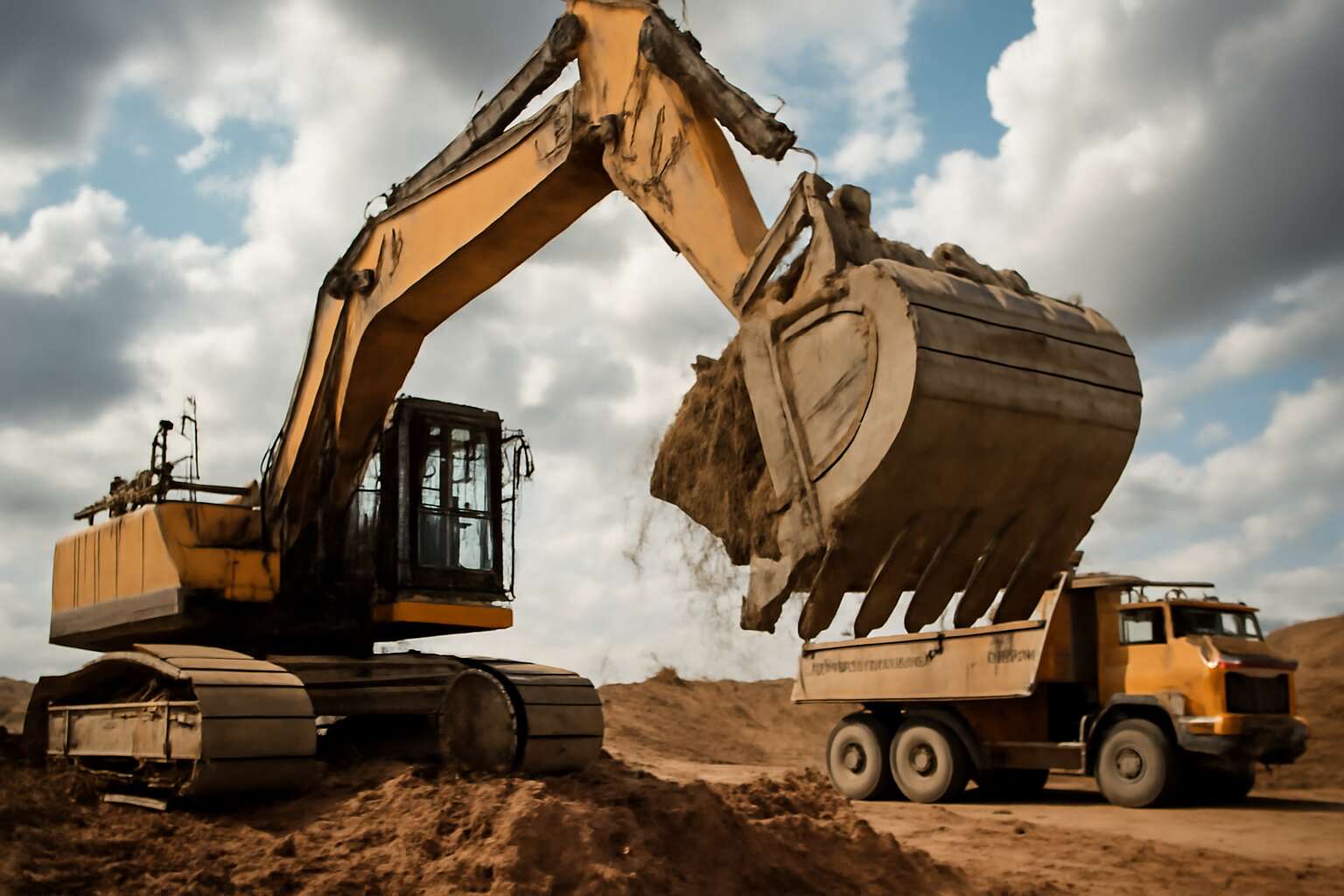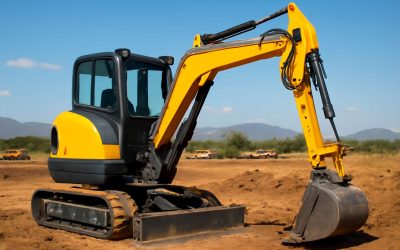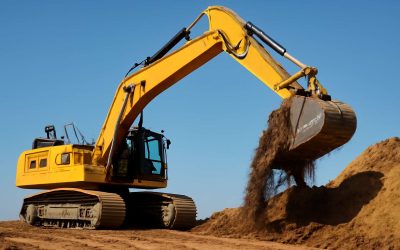Understanding Excavators
Overview of Excavators – Definition and primary functions
In the realm of construction marvels, excavators stand out as giants of versatility and strength. They are often mistaken for trucks, but their primary purpose is quite distinct. An excavator is a heavy-duty machine designed for digging, lifting, and excavation tasks that require precision and power. Its primary functions include trenching, demolition, material handling, and sometimes even forestry work, making it an indispensable asset on any job site.
So, is excavator a truck? Not exactly. While both are vital to construction and earthmoving operations, excavators are characterised by their rotating superstructure and long arm, which grants them a remarkable range of motion. Unlike trucks, which are built mainly for transporting goods, excavators excel at manipulating and moving earth and debris efficiently. This specialised design allows them to perform complex tasks with a level of finesse that trucks simply cannot match.
Types of Excavators – Different models and their applications
Excavators come in a surprising array of models, each engineered for a specific purpose, yet all sharing a common goal: to transform earthmoving into an art form. From compact mini excavators perfect for tight urban sites to massive hydraulic excavators that dominate sprawling construction zones, these machines are the chameleons of the industry. But when exploring their diversity, a common question arises: is excavator a truck? The answer might surprise you. Unlike trucks, which are built primarily for transporting goods, excavators are designed with a rotating superstructure and a long arm, giving them unparalleled versatility in digging, lifting, and demolition tasks.
Each type of excavator is tailored to meet distinct demands. For example, long-reach excavators excel at deep trenching or decommissioning structures, while mini excavators shine in confined spaces. Here’s a quick glance at some popular models:
- Crawler excavators – the workhorses for heavy-duty digging and demolition.
- Wheeled excavators – perfect for urban environments requiring mobility between sites.
- Long-reach excavators – designed for deep or extended operations.
- Mini excavators – compact and agile, ideal for small-scale projects.
Each of these variants underscores the fact that, despite occasional confusion, an excavator is not a truck. It’s a specialised construction beast, crafted for precision and strength in earth-moving tasks—traits that trucks can’t replicate. So, when considering whether an excavator is a truck, the distinction becomes crystal clear: they may share a construction site, but their roles are worlds apart.
Components of Excavators – Major parts and their roles
At the heart of every formidable construction site lies an intricate symphony of components, each playing a vital role in transforming raw earth into engineered marvels. An excavator’s power is not merely in its size but in the harmony of its major parts working seamlessly together. Understanding these components reveals why an excavator is so uniquely suited to its craft—far beyond the capabilities of a simple truck.
The primary parts include the boom, arm, bucket, and the rotating superstructure, all mounted on a sturdy undercarriage. The hydraulic system acts as the lifeblood, delivering the necessary force for movement and precision. Inside, the cab offers a panoramic view, allowing operators to orchestrate each precise motion with finesse. This meticulous design ensures that an excavator can perform complex tasks with a finesse that trucks simply cannot match.
Key components such as the hydraulic cylinders and the swing mechanism work together to provide versatility and stability, allowing these machines to adapt to a variety of tasks—from delicate trenching to heavy lifting. So, when pondering whether an excavator is a truck, it’s clear that beneath its impressive exterior lies a sophisticated ensemble of parts—crafted not just for transportation, but for mastery over earth itself.
What Defines a Truck?
Characteristics of Trucks – Design features and typical uses
In the grand tapestry of machinery that shapes our world, understanding what defines a truck is like unlocking a secret passage to a realm of engineering marvels. Trucks, in their essence, are robust vehicles designed to transport goods, materials, and sometimes even entire worlds of equipment across vast distances. Their characteristic design features include a sturdy chassis, a powerful engine, and an expansive cargo area, making them the backbone of industries from construction to logistics.
Many wonder, is excavator a truck? The answer lies in the subtle distinctions that set these giants apart. While trucks are primarily designed for transportation, excavators are specialised for digging and material handling, with their own unique set of design features such as a rotating cab and hydraulic arms. However, some excavators are mounted on truck-like chassis, blurring the lines between these colossal entities. For instance, articulated dump trucks and truck-mounted excavators embody hybrid characteristics, merging the mobility of trucks with the functional prowess of excavators.
- Design features like high ground clearance for off-road agility
- Heavy-duty suspension systems tailored for rugged terrains
- Specialised attachments for excavation, lifting, and loading
Ultimately, whether an excavator is a truck depends on its configuration and intended purpose. Yet, their shared traits—powerful engines, durable frames, and mobility—highlight the interconnected web of machinery that drives modern industry forward. So, the next time you gaze upon these titanic machines, ponder—are they merely trucks, or something more mythical in their engineering prowess?
Types of Trucks – From pickup trucks to heavy-duty haul trucks
At the heart of every bustling construction site and sprawling logistics hub lies a complex web of machinery — each piece with a distinct purpose and character. When pondering is excavator a truck, one must first unravel what truly defines a truck. Broadly speaking, trucks are vehicles built for the noble task of transporting goods across challenging terrains, their design a testament to resilience and versatility. From the agile pickup to the colossal heavy-duty haul truck, their forms are varied yet unified by a core trait: mobility paired with strength.
While trucks are primarily engineered for hauling, excavators possess a different kind of magic. They are characterised by hydraulic arms, rotating cabs, and specialised attachments, making them masters of digging and material handling. Yet, intriguingly, some machines blur these lines — mounted on truck-like chassis, these hybrids stir the imagination. So, when asking is excavator a truck, it’s a question of configuration and purpose — but one thing remains certain: both are vital threads in the grand tapestry of industry’s machinery.
Functions and Capabilities – Transporting cargo, loading, and other operations
In the shadowed realm of machinery, the question lingers like a whisper in the darkness: is excavator a truck? To unravel this mystery, we must first understand what truly defines a truck. At its core, a truck is a vessel of resilience and purpose, designed to transport cargo across treacherous terrains and unforgiving environments. Their anatomy is characterised by robust frames, powerful engines, and a capacity for heavy loads, making them the stalwart heroes of industry.
Functions and capabilities are the lifeblood of trucks. They are built to move immense quantities of material with relentless efficiency, whether ferrying goods over long distances or performing vital loading operations. From the nimble pickup trucks that navigate narrow alleyways to the colossal heavy-duty haul trucks that dominate open-pit mines, each serves a unique role. Sometimes, these roles overlap in fascinating ways — especially when machinery like excavators, with their hydraulic arms and specialised attachments, are mounted onto truck-like chassis, blurring the lines of classification. This hybrid design stirs curiosity and challenges our perceptions of what makes a vehicle truly a truck.
Comparing Excavators and Trucks
Design and Structure – Physical differences and similarities
When you picture an excavator and a truck side by side, you’d be forgiven for thinking they’re distant cousins in the machinery family—both heavy hitters, but with very different personalities. Physically, the excavator is a beast of balance and flexibility, featuring a rotating cab and a long, articulated arm perfect for digging deep or lifting heavy loads. Meanwhile, trucks are built like tanks on wheels, designed primarily for transportation, with a sturdy chassis and a cab perched on top for the driver. The core question remains: is excavator a truck? The answer hinges on their structure and purpose.
Despite their differences, some similarities in design emerge—both are constructed to endure extreme conditions and heavy workloads. To clarify the physical differences and similarities, consider this:
- Excavators have a tracked or wheeled undercarriage for stability and manoeuvrability on uneven terrain.
- Trucks boast a large cargo bed or trailer, focused on efficient cargo delivery, with a more rigid, elongated frame.
- The excavator’s rotating superstructure allows 360-degree movement, unlike trucks which have a fixed chassis.
In essence, while both are integral to construction and logistics, their structures reflect their distinct roles. So, is excavator a truck? Not quite—though they share the common trait of being heavy-duty, their design philosophies diverge sharply, making each uniquely suited to its task rather than interchangeable. And that’s what makes understanding their physical differences and similarities so fascinating in the machinery universe.
Primary Functions – Digging, lifting, and material handling versus transportation
At first glance, the roles of excavators and trucks seem worlds apart, yet both are indispensable pillars of modern industry. The core question—is excavator a truck?—often sparks debate, but understanding their primary functions reveals the truth. An excavator’s essence lies in its ability to manipulate the earth—digging trenches, lifting heavy materials, and handling loads with precision. Its design champions flexibility, allowing it to perform complex tasks that require finesse and strength in tandem.
Conversely, trucks excel in transportation, moving vast quantities of cargo efficiently across distances. Their primary function revolves around logistics—delivering goods swiftly and reliably. Interestingly, while both machines are designed for heavy-duty operation, their capabilities define their identity:
- Excavators focus on skillful material handling, including digging and lifting.
- Trucks prioritise transportation, with a focus on stability and cargo capacity.
In contemplating whether is excavator a truck, it becomes clear that while they share the trait of heavy-duty construction, they serve fundamentally different roles—each a specialised instrument within the machinery universe. Their physical and operational distinctions underscore the unique purpose behind each design, making them complementary yet distinct entities in construction and logistics.
Operational Mechanisms – Movement, hydraulics, and control systems
When delving into the operational mechanisms of heavy machinery, the distinction between an excavator and a truck becomes strikingly evident. Both are staples of the construction and logistics worlds, yet their movement and control systems diverge in fascinating ways. An excavator’s operational core hinges on a sophisticated hydraulic system that powers its boom, arm, and bucket, offering unparalleled agility for earthworks. These hydraulics translate fluid pressure into precise, forceful movements, allowing the excavator to perform delicate digging as well as heavy lifting with finesse.
Meanwhile, trucks rely on a drivetrain and engine configuration designed for stability and endurance, prioritising the transportation of cargo over intricate manipulation. The control systems for trucks are straightforward, often featuring steering, acceleration, and braking mechanisms that focus on steady, reliable movement. To enhance versatility, many excavators incorporate advanced control consoles that enable operators to manipulate multiple axes simultaneously, unlike trucks which predominantly operate on a linear path.
- Hydraulic systems for excavators
- Engine-driven mobility for trucks
These fundamental differences underscore the question—is excavator a truck?—by highlighting their divergent operational philosophies, despite their shared heavy-duty capabilities.
Is an Excavator Considered a Truck?
Legal and Regulatory Perspectives – Vehicle classification and licensing
Understanding whether an excavator qualifies as a truck isn’t just a matter of semantics; it has profound implications in legal and regulatory contexts. The question, is excavator a truck, often arises in discussions about vehicle classification, licensing, and operational standards. While excavators are primarily designed for digging and lifting, their physical structure and mode of operation sometimes blur the lines with trucks, especially when considering their mobile capabilities.
From a legal perspective, vehicle classification depends largely on specific criteria such as weight, design purpose, and functionality. In many jurisdictions, excavators are categorised separately from trucks due to their specialised functions and construction-focused design. However, when an excavator is mounted on a truck chassis or used in a manner that involves transporting materials over long distances, it might fall under truck regulations, requiring appropriate licensing and registration.
In some cases, the distinction becomes a matter of interpretation—whether the vehicle’s primary purpose is transport or construction. The key lies in understanding the nuances of vehicle classification laws, which can vary significantly across regions. For example, a large, self-propelled excavator might be considered a construction vehicle, whereas a smaller, transportable unit mounted on a truck chassis could be classified as a type of truck. Such distinctions influence licensing requirements, safety standards, and operational restrictions. Ultimately, comprehending the legal and regulatory perspectives surrounding is excavator a truck helps operators and companies navigate compliance effectively while recognising the complex interplay between design, purpose, and law.
Industry Definitions – How industry categorizes excavators and trucks
In the shadowy realm of machinery, the question lingers like a ghostly whisper—is an excavator a truck? Industry definitions cast a long, dark pall over this query, as they often hinge on subtle distinctions that can confound even the most seasoned operators. Excavators, with their sinewy arms and cavernous buckets, are primarily forged for digging and lifting—functions that evoke images of subterranean depths and towering construction sites. Yet, when these behemoths are mounted upon truck chassis or used to ferry materials across desolate stretches, the line between excavator and truck becomes perilously blurred.
In the corridors of industry classification, excavators are generally considered a separate breed—vehicles designed with a focus on construction rather than transportation. However, certain models, especially those modified for long-distance hauling, may fall under the jurisdiction of truck regulations. Their purpose and physical structure often dictate their legal standing. For instance, a compact, transportable excavator might be categorised as a type of truck, particularly if its primary role shifts from excavation to cargo conveyance. This murky boundary underscores the importance of understanding the nuanced definitions that govern vehicle classification, especially when compliance hangs in the balance.
Functional Differences – Why excavators are not trucks despite transportation capabilities
When pondering whether an excavator is a truck, many are surprised by the nuanced distinctions that lie beneath the surface. While excavators can sometimes be seen transporting materials across a construction site, their core design and operational purpose set them apart from trucks. An excavator’s primary role is digging, lifting, and material handling—functions that demand a different set of capabilities than transportation.
Despite the occasional visual overlap, especially with specialised models like the long-reach excavator mounted on a truck chassis, the fundamental difference remains clear. Excavators are built with a focus on stability and hydraulic power for excavation tasks. Their movement mechanisms are hydraulic and controlled with precision, unlike trucks which are designed primarily for road travel and cargo movement. To answer the question, is excavator a truck? The answer is no—though they may share superficial attributes, their functions and structural design are worlds apart.
Can an Excavator Be Used as a Truck?
Transporting Excavators – Using trucks to move excavators between sites
Many wonder whether an excavator can be used as a truck, especially given the remarkable versatility of modern machinery. The truth is, while an excavator’s primary role is excavation and material handling, it is not designed to function as a truck. Instead, trucks serve as the essential transport vehicles that move excavators between sites. This distinction raises a common question: is excavator a truck? The answer lies in understanding their fundamental differences in design and purpose.
Transporting excavators is predominantly achieved through specialised heavy-duty trucks known as lowboy or flatbed trailers. These trucks are built to carry the weight and size of excavators safely and efficiently. The process involves loading the excavator onto a truck, often using a ramp, and securing it with specialised chains and restraints. This method ensures the excavator remains stable during transit, highlighting the clear functional divide: is excavator a truck? No, but trucks are indispensable in the logistics of excavator deployment.
In essence, the role of trucks in excavator transportation underscores a deeper industry truth: machinery is defined by its core functions. Excavators are specialised for digging and lifting, while trucks are designed for logistics and transportation. Although they work in tandem, each retains its unique identity — and that’s the key to understanding why is excavator a truck remains a nuanced question rooted in functionality rather than form.
Excavators on Trucks – Mobile excavators mounted on trucks or trailers
Many ask, “is excavator a truck?” The answer is straightforward yet nuanced. While excavators and trucks work closely together on construction sites, they serve very different roles. An excavator is a specialised machine designed for digging, lifting, and material handling. A truck, on the other hand, is built for transportation and logistics.
Sometimes, you may see mobile excavators mounted on trucks or trailers. These are not true excavators but are often called “excavator trucks” in casual conversation. They are essentially compact excavators fitted onto transport vehicles for easier movement over long distances. This setup allows for quick deployment, but it doesn’t change the fundamental fact: an excavator itself is not a truck.
Understanding whether an excavator is a truck helps clarify industry expectations and regulatory classifications. Trucks are designed with features like flatbeds or lowboy trailers, specifically for hauling heavy equipment such as excavators. So, when considering “is excavator a truck,” the real distinction lies in their core functions—excavators dig, and trucks carry.
Limitations and Considerations – Feasibility and safety concerns
In the bustling theatre of construction, the question echoes with curiosity and nuance—is excavator a truck? While at first glance, both may seem to share a common stage, their roles are as distinct as the actors they portray. An excavator, with its powerful arm and bucket, is a ballet dancer in the dirt, orchestrating digging and lifting with precision and grace. A truck, by contrast, is a steadfast courier, designed to carry cargo across vast terrains, bearing the weight of logistics with unwavering reliability.
Occasionally, the lines blur in the form of mobile excavators mounted on trucks or trailers—compact, versatile machines that can be swiftly deployed and transported. These arrangements are often colloquially called “excavator trucks,” but they do not redefine the core identity: an excavator is fundamentally not a truck.
- They are built for excavation, not transportation.
Understanding this distinction is vital for industry professionals, ensuring clear regulatory classification and safe operational practices. The core functions—digging versus hauling—remain the defining difference, regardless of the mounted configurations or the mobility these hybrid setups offer.
When pondering whether an excavator can be used as a truck, limitations quickly surface. While it’s feasible to transport excavators on trucks using specialised trailers, attempting to repurpose an excavator itself as a transport vehicle is fraught with safety concerns and structural impossibilities. The sheer weight, hydraulic complexity, and design intent do not lend themselves to conversion into a makeshift truck. Instead, the prudent choice is to utilise dedicated transport equipment—those sturdy flatbeds or lowboy trailers—designed to carry heavy machinery securely across distances without risking safety or damaging the equipment itself.
Conclusion
Summary of Key Points – Clarifying the difference between excavators and trucks
Understanding whether an excavator is a truck might seem straightforward at first glance, but the distinctions are more nuanced than many realise. Excavators are specialised construction machines designed primarily for digging, lifting, and material handling. They feature a rotating platform, a long boom, and a hydraulic arm, making them versatile for various heavy-duty tasks. On the other hand, trucks are vehicles built for transportation, with a focus on hauling cargo across different terrains.
While some excavators can be transported on trucks, this does not mean an excavator is a truck itself. Instead, excavators are often mounted on or moved by trucks, especially for short distances or between sites. This relationship highlights the fundamental difference: an excavator is a piece of equipment, whereas a truck is a vehicle designed for movement and logistics.
- Excavators excel at digging, lifting, and handling materials in construction or demolition projects.
- Trucks are essential for transporting these materials or equipment from one location to another.
- Transporting excavators on trucks is common, but their core functions remain distinct—excavators do not serve as the transport vehicles themselves.
In essence, the question: is excavator a truck? Clarifies that while they often work together on construction sites, they are fundamentally different machines with unique roles. Recognising these differences ensures better planning, safety, and efficiency in any project involving heavy machinery and transportation. The key takeaway? An excavator is not a truck; it’s a specialised tool that relies on trucks for mobility when necessary.
Final Thoughts – Why understanding these distinctions matters in construction and logistics
Understanding the distinctions between an excavator and a truck is more than just a matter of semantics; it’s a cornerstone of effective construction and logistics management. When asked, “is excavator a truck?” the answer might seem simple, but the real significance lies in recognising their unique roles within the broader machinery ecosystem. Excavators are specialised tools, built for digging, lifting, and material handling, boasting hydraulic arms and rotating platforms that make them versatile on any site. Conversely, trucks are vehicles designed for transportation, moving cargo and equipment across diverse terrains with efficiency and speed.
This fundamental difference influences not only operational planning but also safety protocols and regulatory compliance. While excavators can be transported on trucks, this does not blur the line between the two—each serves a distinct purpose. Appreciating these nuances enables professionals to optimise workflows and avoid costly mistakes. Ultimately, the key takeaway is clear: an excavator is not a truck, but both are vital cogs in the machinery of modern construction. Recognising this distinction makes all the difference when orchestrating complex projects.




0 Comments